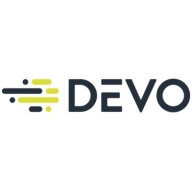

Devo and Elastic Stack compete in data analytics and log management. Elastic Stack has an advantage in features, whereas Devo stands out in support and pricing.
Features: Devo offers intuitive data exploration tools, robust integration capabilities, and a seamless experience for managing large data volumes. Elastic Stack is known for its customizability, comprehensive analytics suite, and superior advanced search capabilities.
Room for Improvement: Devo needs enhanced alerting functions, expanded integrations, and other capability enhancements. Elastic Stack requires a less complex setup, better interface enhancements, and a simplified deployment process.
Ease of Deployment and Customer Service: Devo is favored for its straightforward deployment model and responsive customer support. Elastic Stack, despite its power, presents deployment challenges due to complexity and mixed support feedback.
Pricing and ROI: Devo's setup costs are generally affordable, offering favorable ROI over time. Elastic Stack, although more costly upfront, is seen as a worthwhile investment for its extensive features.


Devo is the only cloud-native logging and security analytics platform that releases the full potential of all your data to empower bold, confident action when it matters most. Only the Devo platform delivers the powerful combination of real-time visibility, high-performance analytics, scalability, multitenancy, and low TCO crucial for monitoring and securing business operations as enterprises accelerate their shift to the cloud.
Elastic Stack is a comprehensive tool for log management, observability, indexing, and security, widely adopted for managing logs, alert creation, SIEM, SOC, and threat analysis. It integrates with CloudStrike and Endpoint Security, enhancing search capabilities and Application Performance Monitoring.
Elastic Stack offers powerful solutions for logging, data storage, and visualization with Kibana. It allows MSSPs to efficiently manage security and assists companies with data analysis. It's known for its easy implementation, scalability, real-time monitoring, and extensive integrations. The open-source nature and community support add significant value, making it a popular choice across industries. While highly capable, there is a need for enhancement in dashboard implementation, data integration, and certain advanced features. Licensing, compatibility, and cost-related improvements can further elevate its efficacy.
What are the key features of Elastic Stack?In healthcare, Elastic Stack enhances database search capabilities, aiding in patient record management and data retrieval. Managed Security Service Providers use it for comprehensive security management, integrating it with tools like firewalls and authentication systems. Companies benefit from its application in Application Performance Monitoring and its flexibility in adapting to hybrid environments.
We monitor all Log Management reviews to prevent fraudulent reviews and keep review quality high. We do not post reviews by company employees or direct competitors. We validate each review for authenticity via cross-reference with LinkedIn, and personal follow-up with the reviewer when necessary.